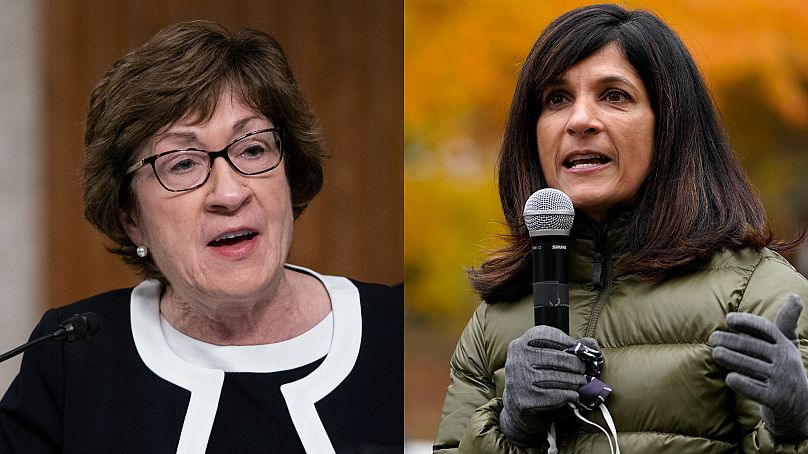US voters won't just election a president on November 3, they're also choosing 35 Senators.
While many people are staying tuned for the US presidential race between Donald Trump and Joe Biden next week, others will be closely watching the Senate.
The Senate race is key for both political parties who will be hoping to control the upper chamber of Congress to pass their legislative priorities.
The left-leaning Democratic Party won the US House of Representatives in 2018, allowing them to pass several bills in the larger chamber.
But the right-leaning Republican party has kept control of the Senate, making it difficult to pass legislation through both houses.
Experts say that even if Joe Biden were to win the presidency, it would be very difficult to pass any legislation without control of the Senate.
"If Democrats are able to win the Senate, and we also assume that Democrats have kept the House, which is a virtual given, then you have unified control and that makes it a lot easier for Joe Biden to pass measures," said Jessica Taylor, the Senate and Governors Editor at the Cook Political Report.
"If you have a Republican senate, they would stymie a lot of what [Biden] would try to get done," Taylor added.
Most recently, Republicans were able to rush through Trump’s Supreme Court nominee due to their Senate majority, for instance.
What is the current makeup of the US Senate?
There are 100 seats in the US Senate and the Republican Party currently holds 53 of them.
Democrats hold 45 Senate seats, but two independent senators typically vote with the party, which effectively gives them 47 seats.
The Democrats would need to pick up three Senate seats in order to have 50-50, which means, provided they win the presidency, the vice president would be able to break a tie, giving them a majority.
But many pollsters expect the Democrats will lose a Senate seat in Alabama, which is a solidly Republican state, meaning they would need to win four seats to win the Senate.
That also means Republicans can only afford to lose three seats in the chamber.
The Republicans have 23 seats up for reelection, however, whereas the Democrats have just 12 up for reelection, most of which are considered solid.
"For Democrats, the path to a bare 50-seat Senate majority is: lose Alabama, but pick up Arizona, Colorado, Maine, and one of Iowa or North Carolina. This is something we think is feasible," said J. Miles Coleman at the University of Virginia's Centre for Politics.
Republicans have had control of the Senate since flipping the chamber (reclaiming it from the Democrats) in 2014.
What are the Senate races to watch?
Republicans are expecting to pick up a seat in Alabama which is a solidly Republican state.
Democrat Doug Jones, a former prosecutor, previously won there in a special election but now most pollsters say the race is leaning Republican towards candidate Tommy Tuberville, a retired football coach.
Arizona is a state that Democrats are hoping to pick up with Mark Kelly, the former husband of Gabby Giffords, a US representative who was shot at a constituent meeting in 2011.
Kelly, a former astronaut, is leading in polls against Martha McSally, the Republican senator from the state. Arizona, which voted for Donald Trump in 2016, is also a swing state, with polls favouring Joe Biden.
Democrats also have their eyes on Colorado, where John Hickenlooper, the former governor of Colorado and mayor of Denver, faces current Senator Cory Gardner, who won in 2014.
Both Arizona and Colorado have been rated "lean Democrat" by the Cook Political Report, an election analysis newsletter, meaning polls show they are likely to be won by Democrats. Biden is also favoured to win the presidency in both states.
Maine is another state with a tough Senate race that many experts will be watching.
Susan Collins, a Republican senator who is seen as more centrist, faces off against Democrat Sara Gideon, Maine's House speaker, in a seat that has been a priority for Democrats.
Collins saw her popularity fall when she cast a crucial vote with her party in favour of confirming Trump nominee Brett Kavanaugh to the Supreme Court in 2018.
"If they flip those three seats -- they're the lowest-hanging fruit -- that gets Democrats to 49 overall," said Coleman.
Iowa and North Carolina are also potential states that Democrats could win and are now seen as "toss-up" races.
Senator Joni Ernst in Iowa is up against Theresa Greenfield, a businesswoman who previously ran for Congress but who has never held elected office.
"First-term Sen. Joni Ernst seems to be struggling and will be outspent during this final stretch," said Coleman.
North Carolina's Republican Senator Thom Tillis' seat is also facing a challenge from Democratic candidate Cal Cunningham, who despite an extramarital affair scandal is still leading in polls.
Then there are some surprises, where Democratic candidates are in close races in solidly Republican states.
South Carolina's Republican Senator Lindsey Graham is facing a challenge from Jaime Harrison, who previously served as chair of the South Carolina Democratic Party.
Though Harrison is behind in the polls, it's a surprisingly tight race, and Harrison has out-raised Graham and broke fundraising records in a state that Trump won in 2016 by 14 points.
Graham has been a fierce defender of Donald Trump throughout the president's administration.
Meanwhile, in Georgia, Democrats also have a chance with 33-year-old Jon Ossoff who faces Republican Senator David Perdue. Democrat Raphael Warnock could also make a runoff after a special election for the second Senate seat there.
Biden recently campaigned in Georgia, a seat that many Democrats are hoping to win in the presidential election and where some polls show him ahead of Trump.
Michigan is a state where Republicans are hoping to win a Senate seat with candidate John James, a veteran who previously served in the army for eight years. But incumbent Democrat Gary Peters is likely to win the race, according to the latest polls.
How likely is it for the Senate to flip?
Experts say that Democrats are slightly favoured to win the Senate this year, but it will depend in part on turnout and the presidential race.
American voters often vote for one party in multiple races, so Biden winning the presidential election could help the Democrats to win the Senate race.
"We see fewer and fewer instances of voters spilling their tickets," said Taylor at the Cook Political Report.
"In 2016 race every single Senate race went the same way as the presidential race in that state."
This could also be difficult for Democrats who will likely need to flip Senate seats in states that traditionally vote Republican.














